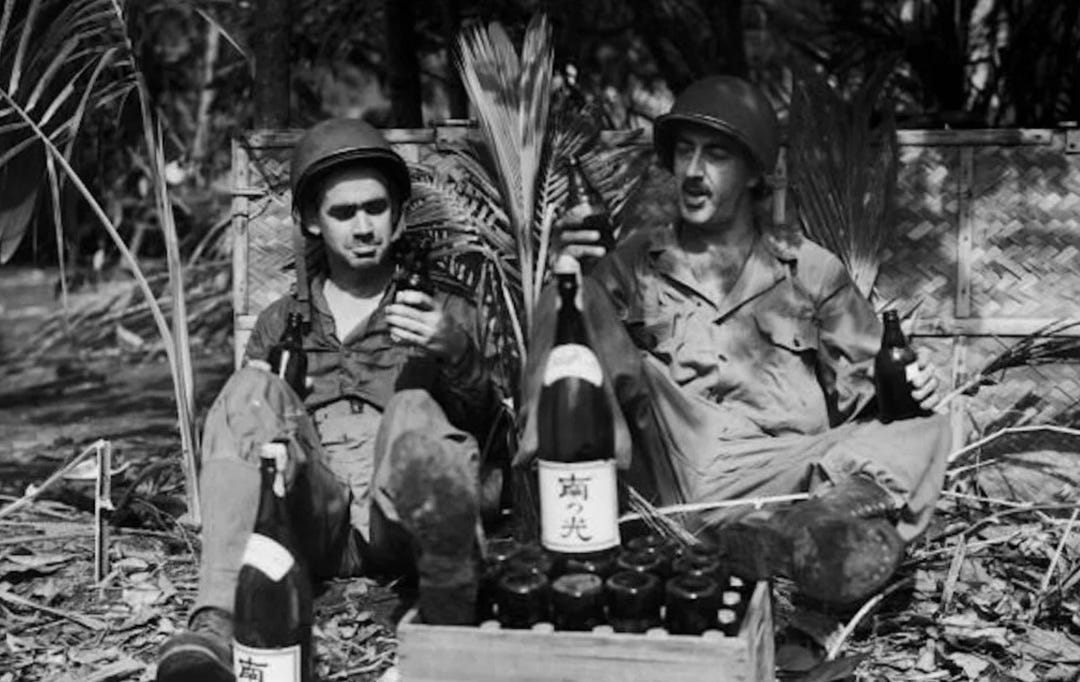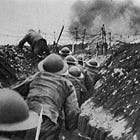Dark Humor and Hard Times: Why We Laugh When Life Sucks
WWII, finding meaning, and living fully
A WWII era joke goes like this.
A P-38 Lightning fighter plane is shot down over the jungle. When the rescue team finally gets to the pilot, he is obviously dying. Bones stick out of his legs; his arms are bent at odd angles; his chest is cratered from hitting the cockpit; his face is bloody and battered; and every time he exhales, red foam spews from his lips in wet strands. The medic frees him from the wrecked plane and can only stare at him. Finally, for lack of anything else to say, the medic asks, “How do you feel?”
To which the pilot says, “It only hurts when I laugh.”
Well.
The irony of the pilot in the joke is that he would only feel pain while laughing, but he was obviously in the worst pain imaginable. The irony of the fighters telling the joke is that they were the same fighters for whom it could become a reality in the next twenty-four hours—and yet they giggled like school girls.
So why does a mere war joke matter today?
Take perspective: It is strange we are the only animals who can keep perspective on our immediate circumstances: we can be in danger and yet think of safety to feel hope, and we can be in safety and remind ourselves of danger to feel gratitude. So it is doubly strange how quickly we lose perspective. Even those who have been shot at, those who conquered cancer, and those who wore zebra clothes on their skeletal bodies in concentration camps—even they can lose their perspective after long enough time. The point is war jokes pop the comfort-bubble and remind us of our mortality. Of the shortness of our lives. They say, Savor each meal and laugh as if it were the last. Quit the soul-sucking job and find meaningful work, and do it now. Love, and do it now while you still can.
Take fate: When faced with the vision of pain and misery and the promise of a godawful death, our fighters could laugh. Afghanistan, Vietnam, WWII, Revolutionary, Peloponnesian, Trojan—there always existed a grim humor. What else was there to do? As in war, so in life: whether we scream Oh God why me and tremble or say Fuck it and grin, our fate will be what it will be. The jokes challenge us to laugh at the prospect of a tumble in the jungle, or whatever our minds are worked up about; to gain such mastery over our minds that the harder life gets, the harder we laugh at it. We are not broken by crossing the Styx; we are only broken if we fail to laugh at least once on the little wooden boat on the way there.
Take meaning: The remarkable fact is that our GI’s (GI means “government issue,” a label they hated because like all good soldiers they hated the government) were willing to take the risk of becoming the mangled pilot with the wicked sense of humor. And they took that risk again and again. And then again. War—and its humor—force us to answer the Big Questions: “Why am I here? What is the point of my life?” When we see how easily flesh and blood and bone can be vaporized, pulpified, or honeycombed by bits of steel, things change. Almost any answer to the Big Questions will do: family, glory, a girl, a good fight, or, for most of them, simply being there for their mates when it mattered most.
The main value of a war joke is this: it asks us to define what we are willing to die for—and therefore what we are willing to live for.
Now we can answer our question. Combat humor matters because it is an ancient and amusing way to cure the crisis of meaninglessness at present.
So how do we get the benefit of war humor without war itself?
In a word, contemplation.
Pascal said, “All of humanity's problems stem from man's inability to sit quietly in a room alone.” It may seem counterintuitive to go from laughing combatants to sitting quietly alone in a room. It is not. War humor made our fighters, ancient and modern, sit quietly and contemplate their lives in the few moments they could actually be alone. It made them contemplate the worst case and learn to laugh in its face like those crazy bastards who swam, and canoed, and skydived, and stalked, and drove, and sprinted into the inferno of war, and who did it again and again throughout history; those whose values meant more to them than their own lives.
War is not needed since we have its lesson—and its humor.
We can contemplate why we will take such risks and for whom: friend, dog, plant, parent, child.
And we can learn to laugh when it sucks the most.
If you enjoyed this, please consider adding a like, restacking, and sharing this essay. This is how it reaches more readers.






Thank you. Such a great read. As a mum of a son with Schizophrenia and mood disorder, my husband and I have found that dark humour has literally kept us going during the very worst of times. It has literally saved our own sanity.
Thanks Sam. Well written. When I was in Vietnam, and we ignored or dodged some stupid order, our refrain was, “What are they going to do to us, send us to Vietnam?”